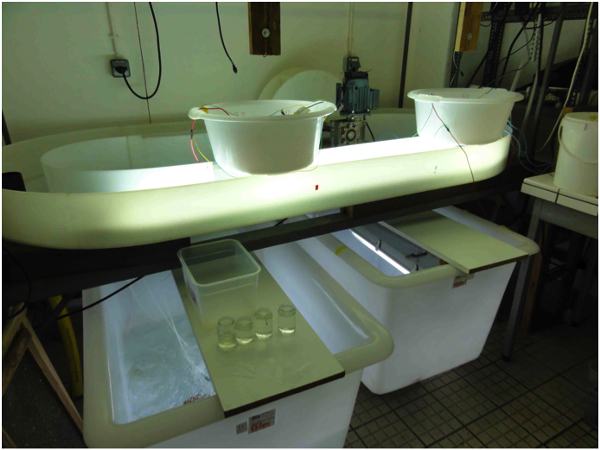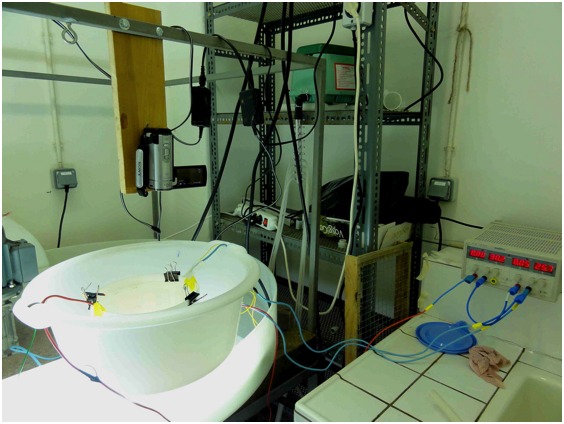
PLENET Sandrine MCU- HDR
Enseignant chercheur : BAH
Responsable scientifique : Espace Expérimental indoor
Université Lyon 1
CNRS, UMR 5023 - LEHNA,
Laboratoire d'Ecologie des Hydrosystèmes Naturels et Anthropisés
6, rue Raphaël Dubois - Bât. Forel
F-69622 Villeurbanne Cedex France
(+33) 04 72 43 28 93 (+33) 04 72 43 11 41
Cette adresse e-mail est protégée contre les robots spammeurs. Vous devez activer le JavaScript pour la visualiser.

MOTS CLES
Plasticité phénotypique, relation génotype * environnement, prédation, fragmentation de l’habitat, érosion génétique, pollution, contraintes hydrauliques
Mes travaux de recherche s’inscrivent dans le domaine de l’écologie évolutive (plasticité phénotypique, potentiel adaptatif) et de la conservation (fragmentation de l’habitat, déclin des espèces). 3 axes de recherches ont été ou sont actuellement développés :
1- Plasticité phénotypique et adaptation locale : Cet axe est central à l’ensemble de mes recherches passées et actuelles. Mes recherches consistent en des tests d’hypothèse sur les conditions de production et d'évolution de la plasticité (i.e. compromis vs hiérarchie, ajustement de l'investissement) ou de l’adaptation locale au cours du développement post-embryonnaire. Ces travaux consistent en des comparaisons inter-populations de la réponse des organismes à des contraintes biotiques (prédation), hydrauliques ou chimiques (polluants). Ils sont aussi centrés sur les rôles de la plasticité en écologie et tentent de corréler la valeur adaptative avec l'utilisation de l'habitat et la distribution des espèces.
2 – Erosion génétique/fitness/potentiel adaptatif : l’objectif est d’explorer l’impact de la fragmentation des habitats sur le comportement et la fitness des individus, et sur le potentiel adaptatif des populations isolées et altérées génétiquement en réponse à un environnement variable, stressant ou face à de nouvelles contraintes.
3 – Lien phylogénie/distribution des espèces/fitness : ces travaux sont centrés sur l'écologie des espèces, leur utilisation de l’habitat et la réponse des traits à des contraintes de milieu (e.g. contraintes hydrauliques) et leur distance phylogénétique.
MODELES BIOLOGIQUES
Les modèles biologiques étaient dans le passé les Amphibiens anoures. Les modèles actuels sont les invertébrés et les poissons
Les approches employées sont :
- une approche expérimentale rigoureuse en laboratoire ;
 - une approche descriptive en milieu naturel ;
- une approche descriptive en milieu naturel ;
- une approche génétique : microsatellites.DISCIPLINES ENSEIGNEES
Biologie du Développement et de la Reproduction (L2-L3)
Ecologie générale et Ecologie évolutive ( L3-L3P)Enseignements Préprofessionnels (L1-L2-L3)
RESPONSABILITES
UE Reproduction et Développement (L2 BGSTU)
UE Zones Humides (L3 pro ATIB)
Responsable pédagogique de formation : 5 UE Transversales (L1-L2-L3) – 3000 étudiantsENCADREMENTS
Alice Merle (doctorant) - en cours. Adaptation locale, évolution rapide et évolution convergente des caractéristiques du mouvement en réponse à la fragmentation du paysage. Univ. Lyon 1.
- 2025 Bererd, S., David, P., Teulier, L., Plénet, S., Luquet, E., 2025 - Temperature-dependent benefits and costs of cytoplasmic male sterility in snail Physa acuta. Proceedings of the Royal Society B: Biological Sciences, 292 (2038), ⟨10.1098/rspb.2024.1762⟩2025 Dejeux, L., Saclier, N., Tariel-Adam, J., Hoareau, M., Lefébure, T., Konecny, L., Plénet, S., Luquet, E., 2025 - Transcriptomic basis of within- and trans-generational predator-induced plasticity in the freshwater snail Physa acuta. Heredity, 134 (7), pp.439-449. ⟨10.1038/s41437-025-00775-9⟩.2024 Laugier, F., [...], Braun, A., Konecny-Dupré, L., Lefébure, T., Luquet, E., Plénet, S., [...], David, P., 2024 - Both nuclear and cytoplasmic polymorphisms are involved in genetic conflicts over male fertility in the gynodioecious snail, Physa acuta. Evolution - International Journal of Organic Evolution, 78, pp.1227-1236. ⟨10.1093/evolut/qpae053⟩2023 Tariel-Adam, J., Luquet, E., Plénet, S., 2023 - Sensitive windows for within- and trans-generational plasticity of anti-predator defences. Peer Community Journal, 2023, 3, pp.e71. ⟨10.24072/pcjournal.304⟩2022 David, P., Degletagne, C., Saclier, N., Jennan, A., Jarne, P., Plénet S., Konecny, L., François C., Guégen, L., Garcia, N., Lefébure, T., Luquet, E. Extreme mitochondrial DNA divergence underlies genetic conflict over sex determination. Current Biology, 32 : 2325-2333. ⟨10.1016/j.cub.2022.04.014⟩2020 Tariel, J., Luquet, E., Plénet, S., 2020 - Interactions Between Maternal, Paternal, Developmental, and Immediate Environmental Effects on Anti-predator Behavior of the Snail Physa acuta. Frontiers in Ecology and Evolution, 8, 591074.2020 Tariel, J., Plénet, S., Luquet, E. 2020 - Transgenerational Plasticity in the Context of Predator-Prey Interactions. Frontiers in Ecology and Evolution, 8, 548660.2020 Tariel, J., Plénet, S., Luquet, E., 2020 - How do developmental and parental exposures to predation affect personality and immediate behavioural plasticity in the snail Physa acuta ? Proceedings of the Royal Society B.2020 Tariel, J., Plénet, S., Luquet, E.. 2020 - Transgenerational plasticity of inducible defences: Combined effects of grand-parental, parental and current environments. Ecology and Evolution, 10:2367-2376.
2015 Devaux, A., Bony, S., Plenet, S., Sagnes, P., Segura, S., Suaire, R., Novak, M., Gilles A., Olivier, J.M., 2015 - Field evidence of reproduction impairment through sperm DNA damage in the fish nase (Chondrostoma nasus) in anthropized hydrosystems. Aquatic Toxicology 169 : 113–122.2015 Luquet, E., Léna, J.P., Miaud, C., Plénet, S., 2015 - Phenotypic divergence of the common toad (Bufo bufo) along an altitudinal gradient: evidence for local adaptation. Heredity, 114(1) : 69-79.
2013 Luquet, E., Léna, J.P., David, P., Prunier, J., Joly, P., Lengagne, T., Perrin, N., Plénet, S., 2013 - Within- and among-population impact of genetic erosion on adult fitness-related traits in the European tree frog Hyla arborea. Heredity, 110 : 347–354.
2013 Wardziak, T., Luquet, E., Plénet, S., Léna, J.P., Oxarango, L., Joly, P., 2013 - Impact of both desiccation and exposure to an emergent skin pathogen on transepidermal water exchange in the palmate newt Lissotriton helveticus. Diseases Of Aquatic Organisms, 104 : 215–224.
2012 Luquet, E., Garner, T.W.J., Léna, J.P., Bruel, C., Joly, P., Lengagne, T., Grolet, O., Plénet, S., 2012 - Genetic erosion in wild populations makes resistance to a pathogen more costly. Evolution, 66(6) : 1942-1952.
2011
Luquet E., Vorburger C., Hervant F., Joly P., Kaufmann B., Schmeller D.S., Léna J.-P., Grolet O. Konecny L. & Plénet S. 2011 - Invasiveness of an introduced species: the role of hybridization and ecological constraints. Biol. Inv. 13 : 1901-1915.
Luquet E., David P., Léna J.-P., Joly P., Konecny L., Dufresnes C., Perrin N. & Plénet S. 2011 - Heterozygosity-fitness correlations among wild populations or European tree frog (Hyla arborea) detect fixation load. Mol. Ecol. 20 : 1877-1887.
Dufresnes C., Luquet E., Plénet S., Stöck M. & Perrin N. 2011 - Polymorphism at a sex-linked transcription cofactor in European tree frogs (Hyla arborea): sex-antagonistic selection or neutral processes? Evol. Biol. 38/2 : 208-213.
Gomez D., Richardson N., Théry M., Lengagne T., Léna J.-P., Plénet S. & Joly P. 2011 - Multimodal signals in male European treefrog (Hyla arborea), and the influence of population isolation on signal expression. Biol. J. Linn. Soc. 103/3 : 633-647.
Luquet E., Léna J.-P., David P., Joly P., Lengagne T., Perrin N. & Plénet S. 2011 - Consequences of genetic erosion on fitness and phenotypic plasticity in European treefrog populations (Hyla arborea). J. Evol. Biol. 24/1 : 99-110.
2010
Gomez D., Richardson N., Lengagne T., Derex M., Plénet S., Joly P., Léna J.-P. & Théry M. 2010 - Support for a role of colour vision in mate choice in Hyla arborea. Behaviour 147 : 1753-1768.
Richardson N., Joly P., Léna J.-P., Plénet S. & Lengagne T. 2010 - The challenge of finding a high-quality male : a treefrog solution based on female assessment of male calls. Behaviour 147 : 1737-1752.
Richardson N., Gomez D., Durieux R., Théry M., Joly P., Léna J.-P., Plénet S. & Lengagne T. 2010 - Hearing is not necessarily believing in nocturnal anurans. Biol. Letters 23 : 633-635.
Broquet T., Angelone S., Jaquiery J., Joly P., Léna J.-P., Lengagne T., Plénet S., Luquet E. & Perrin N. 2010 - Genetic bottlenecks driven by population disconnecton. Conserv. Biol. 24/6, 1596-1605.
2009
Planade B., Léna J-P., Hi L., Plénet S., Guegan J.-F., Thomas F., Hurtrez-Bousses S., Renaud F. & Joly P. 2009 - Tracking a heterosis effect in the field : tadpole resistance to parasites in the water frog hybridogenetic complex. Parasitology 136 : 1003-1013.
Gomez D., Richardson C., Lengagne T., Plénet S., Joly P., Léna J.-P. & Théry M. 2009 - The role of nocturnal vision in mate choice: females prefer conspicuous males in the European treefrog (Hyla arborea). Proc. R. Soc. B. 276 : 2351-2358.
2008
Lengagne T., Plénet S. & Joly P. 2008 - Breeding behaviour and hybridization: variation in male chorusing behaviour promotes mating among taxa in waterfrogs. Anim. Behav. 75 : 443-450.
2007
Joly P., Guesdon V., Fromont E., Plénet S., Grolet O., Guegan J.-F., Hurtrez-Bousses S., Thomas F. & Renaud F. 2007 - Heterozygosity and parasite intensity : lung parasites in the water frog hybridization complex. Parasitology 135 : 95-104.
Schmeller D., Pagano A., Plénet S. & Veith M. 2007 - Introducing water frogs - Is there a risk for indigenous species in France? C. R. Biologies 330 : 684-690.
2005
Téplitsky C., Plénet S. & Joly P. 2005 - Costs and limits of dosage response to predation risk: to what extent can tadpoles invest in anti-predator morphology? Oecologia 145 : 364-370.
Plénet S., Joly P., Hervant F., Fromont E. & Grolet O. 2005 - Are hybridogenetic complexes structured by habitat in water frogs ? J. Evol. Biol. 18/6 : 1575-1586.
Joly P., Morand A., Plénet S. & Grolet O. 2005 - Canalization of size at metamorphosis despite temperature and density variations in Pelodytes punctatus. Herpetol. J. 15 : 45-50.
Téplitsky C., Plénet S., Léna J.-P., Mermet N., Malet E. & Joly P. 2005 - Escape behaviour and ultimate causes of specific induced defences in an anuran tadpole. J. Evol. Biol. 18/1 : 180-190.
2004
Téplitsky C., Plénet S. & Joly P. 2004 - Hierarchical responses of tadpoles to multiple predators. Ecology 85/10 : 2888-2894.
2003
Téplitsky C., Plénet S. & Joly P. 2003 - Tadpoles' responses to risk of fish introduction. Oecologia 134 : 270-277.
2001
Pagano A., Joly P., Plénet S., Lehman A. & Grolet O. 2001 - Breeding habitat partitioning in the Rana esculenta complex: the intermediate niche hypothesis supported. Ecoscience 8/3 : 294-300.
2000
Plénet S., Hervant F. & Joly P. 2000 - Ecology of the hybridogenetic Rana esculenta complex : differential oxygen requirements of tadpoles. Evol. Ecol. 14 : 13-23.
Plénet S., Pagano A., Joly P. & Fouillet P. 2000 - Variation of plastic responses to oxygen availability within the hybridogenetic R. esculenta complex. J. Evol. Biol. 13/1 : 20-28.
1999
Plénet S. 1999 - Metal accumulation by an epigean and a hypogean freshwater amphipods: some considerations for water quality assessment. Water Environ. Res. 71 : 1298-1309.
1998
Plénet S., Joly P. & Pagano A. 1998 - Is habitat requirement by an oxygen-dependent frog (Rana ridibunda) governed by its larval stage? Archiv. Hydrobiol. 143 : 107-119.
1996
Fruget J.-F., Dessaix J. & Plénet S. 1996 - Macroinvertebrate communities of the Doubs River prior to the completion of the Rhine-Rhone connection. Regul. Rivers, Research & Management, 12 : 617-631.
Malard F., Plénet S. & Gibert J. 1996 - The use of invertebrates in groundwater biomonitoring: a rising research field. Ground Water Moni. R. 16 : 103-113.
Plénet S., Hugueny H. & Gibert J. 1996 - Invertebrate community responses to physical and chemical factors at the river / aquifer interaction zone. II. Downstream from the city of Lyon. Archiv. Hydrobiol. 136/1 : 65-88.
1995
Plénet S., Gibert J. & Marmonier P. 1995 - Biotic and abiotic interactions between surface and interstitial systems in rivers. Ecography 18 : 296-309.
Gibert J., Marmonier P., Vanek V. & Plénet S. 1995 - Hydrological exchange and sediment characteristics in a river bank: relationship between heavy metals and invertebrate community structure. Can. J. Fish. Aquat. Sci. 52 : 2084-2097.
Plénet S. & Gibert J. 1995 - Comparison of surface water / groundwater interface zones in fluvial and karstic systems. C. R. Acad. Sci. 318 : 499-509.
Plénet S. 1995 - Freshwater amphipods as biomonitors of metal pollution in surface and interstitial aquatic systems. Freshwat. Biol. 33/1 : 127-137.
1994
Plénet S. & Gibert J. 1994 - Invertebrate community responses to physical and chemical factors at the river / aquifer interaction zone. I. Upstream from the city of Lyon. Archiv. Hydrobiol. 132/2 : 165-189.
1992
Plénet S., Marmonier P., Gibert J., Stanford J., Bodergat A.M., & Schmidt C.M. 1992 - Groundwater hazard evaluation: a perspective for the use of interstitial and benthic invertebrates as sentinels of aquifer metallic contamination. Am. Wat. Res. Ass. 319-329.
Plénet S., Gibert J. & Vervier P. 1992 - A floodplain spring: an ecotone between surface water and groundwater. Regul. Rivers, Research































